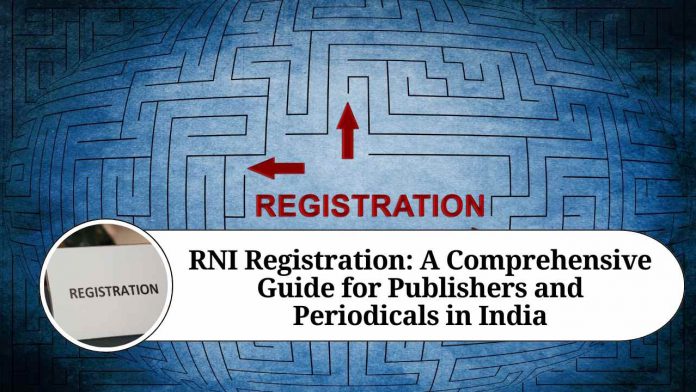Introduction
For publishers and periodicals in India, the Registrar of Newspapers for India (RNI) registration is an essential requirement to legally operate and distribute print media. The RNI registration ensures authenticity, credibility, and compliance with regulatory frameworks. In this blog, we will explore the RNI registration process, its benefits, and the necessary steps to successfully obtain RNI registration.
What is RNI Registration?
The Registrar of Newspapers for India (RNI) is a statutory body established under the Press and Registration of Books Act, 1867. RNI’s primary responsibility is to maintain a comprehensive database of newspapers, periodicals, and other publications in India. The RNI registration provides publishers with a unique identity, confirming their legality and adherence to publishing guidelines.
Benefits of RNI Registration
- Legal Recognition: RNI registration grants legal recognition to newspapers and periodicals, ensuring compliance with governmental regulations. It establishes authenticity and builds trust among readers and advertisers.
- Copyright Protection: RNI registration enables publishers to protect their intellectual property rights. It serves as substantial evidence in case of copyright infringement and strengthens legal claims.
- Access to Government Schemes: Registered publishers can avail themselves of various government schemes, incentives, and benefits related to the media industry. This includes subsidies, grants, and other financial assistance programs.
- Advertisement Revenue: Many government and private advertisers prefer to publish their advertisements in RNI-registered newspapers and periodicals. Registration enhances credibility and increases the chances of securing advertising partnerships, which can be a significant revenue source for publishers.
Steps for RNI Registration
Step 1: Gather Required Documents Before initiating the RNI registration process, ensure you have the following documents ready:
- Duly filled and signed application form in the prescribed format.
- Declaration form (affidavit) in the prescribed format.
- Copies of the first and last page of the newspaper/periodical.
- Details of the publisher, editor, printer, and owner(s).
- Title verification certificate (if applicable).
- Copies of the newspaper/periodical’s recent issues.
- Demand Draft or payment receipt for the registration fee.
Step 2: Submit Application Visit the official RNI website or the nearest RNI office to submit your application. Ensure that the application is complete and all supporting documents are attached. Pay the prescribed registration fee, which varies based on the periodicity and language of the publication.
Step 3: Verification and Scrutiny Upon submission of the application, the RNI authorities will review the documents and conduct verification checks. This includes verifying the circulation figures, ownership details, and other relevant information provided in the application.
Step 4: Confirmation and Registration If the application and documents are found to be in order, the RNI will issue a Registration Certificate and allocate a unique registration number. The certificate serves as proof of registration and should be prominently displayed in the publication.
Conclusion
Obtaining RNI registration is crucial for publishers and periodicals in India to establish legal legitimacy, protect intellectual property, and gain access to various benefits and opportunities. By following the outlined steps and ensuring compliance with the required documents, publishers can successfully register with the Registrar of Newspapers for India and enjoy the advantages that come with it. RNI registration not only enhances credibility but also facilitates growth and expansion in the dynamic landscape of print media in India.
Read more useful content:
Frequently Asked Questions (FAQs)
Q1: Who needs to register with the Registrar of Newspapers for India (RNI)?
A1: Publishers of newspapers and periodicals in India are required to register with the RNI.
Q2: What is the purpose of RNI registration?
A2: RNI registration serves to ensure the authenticity and legality of newspapers and periodicals, while also providing copyright protection and access to various government schemes.
Q3: How can I obtain the RNI registration application form?
A3: The RNI registration application form can be downloaded from the official RNI website or obtained from the nearest RNI office.
Q4: What are the essential documents required for RNI registration?
A4: The key documents include a duly filled application form, a declaration form (affidavit), copies of the newspaper/periodical, details of the publisher/editor/printer/owner(s), title verification certificate (if applicable), copies of recent issues, and the registration fee payment receipt.
Q5: How much is the registration fee for RNI registration?
A5: The registration fee varies based on the periodicity and language of the publication. The exact fee structure can be obtained from the RNI website or office.
Q6: Can I submit the RNI registration application online?
A6: As of my knowledge cutoff in September 2021, online submission of RNI registration applications was not available. However, it is recommended to check the latest updates on the RNI website or contact the RNI office for any changes in the application process.
Q7: How long does it take to obtain RNI registration?
A7: The processing time for RNI registration varies, and it can take several weeks or even months. The duration depends on factors such as the completeness of the application, verification process, and workload at the RNI office.
Q8: Can I start publishing my newspaper/periodical before obtaining RNI registration?
A8: It is advisable to complete the RNI registration process before commencing publication. Operating without registration may lead to legal complications and penalties.
Q9: Do I need to renew my RNI registration periodically?
A9: As of my knowledge cutoff, RNI registration did not require periodic renewal. However, it is essential to stay updated with the latest guidelines and regulations issued by the RNI to ensure compliance.
Q10: Can I register more than one newspaper or periodical under a single RNI registration?
A10: Each newspaper or periodical should have a separate RNI registration. However, if you publish multiple editions or editions in different languages of the same newspaper, they can be included under a single registration. It is recommended to consult the RNI office for specific guidance based on your publishing setup.




















